During the last six years (2013-2019), the Agricultural Extension in South Asia (AESA) Network has served as a platform for collating the voices, insights, concerns, and experiences of people in the extension sphere of South Asia. Diverse professionals shared their concerns on the present and future of Extension and Advisory Services (EAS) in the form of blog conversations for AESA. Together, all of these individuals who are involved, interested and passionate about EAS, discussed ways to move beyond some of the seemingly intransigent problems that are hindering the professionalization of EAS. Nevertheless, these blogs also take the time to celebrate and salute the signs of promising new beginnings.
This publication is an effort on our part to compile 100 such conversations on EAS, which were originally published as AESA blogs, starting in February 2013, into this book. Several of our readers have been asking us to assemble all these reflections into a single document so that these are available as a good reference document for a wide spectrum of actors involved in EAS – scholars, practitioners, trainers, faculty, innovation intermediaries, mentors, leaders and managers – all of whom are involved in driving agricultural and rural transformation.
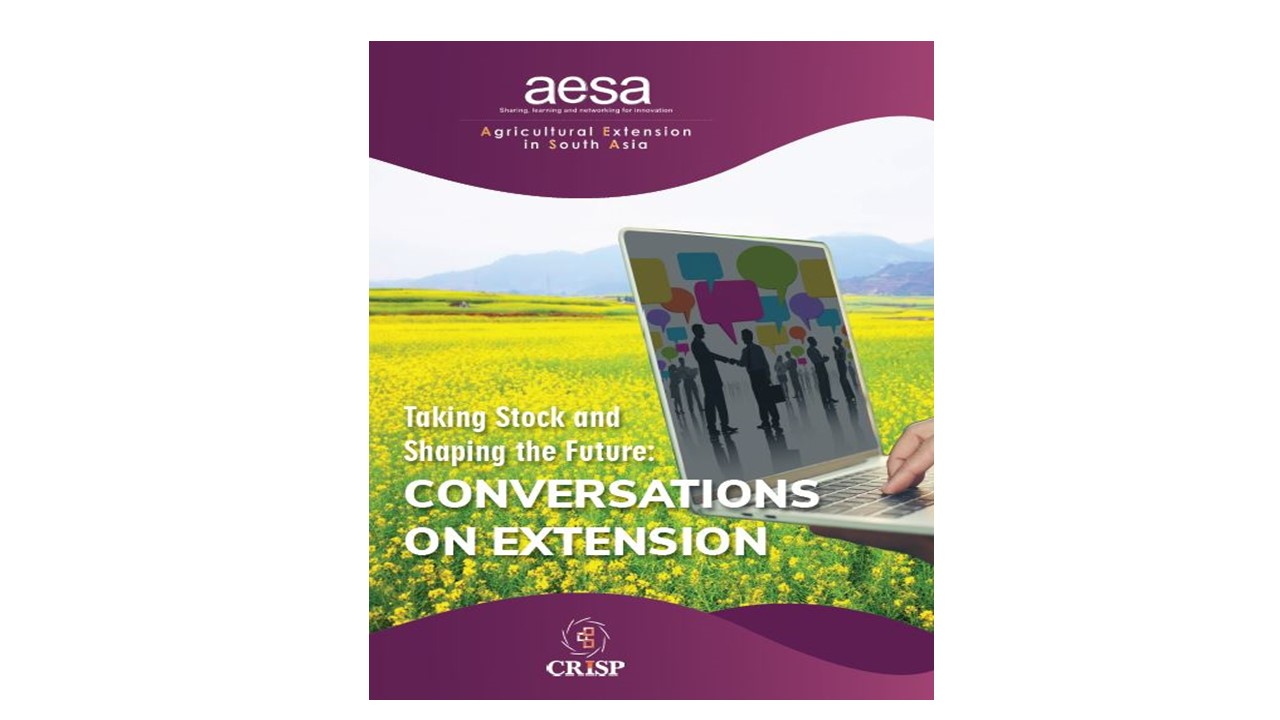

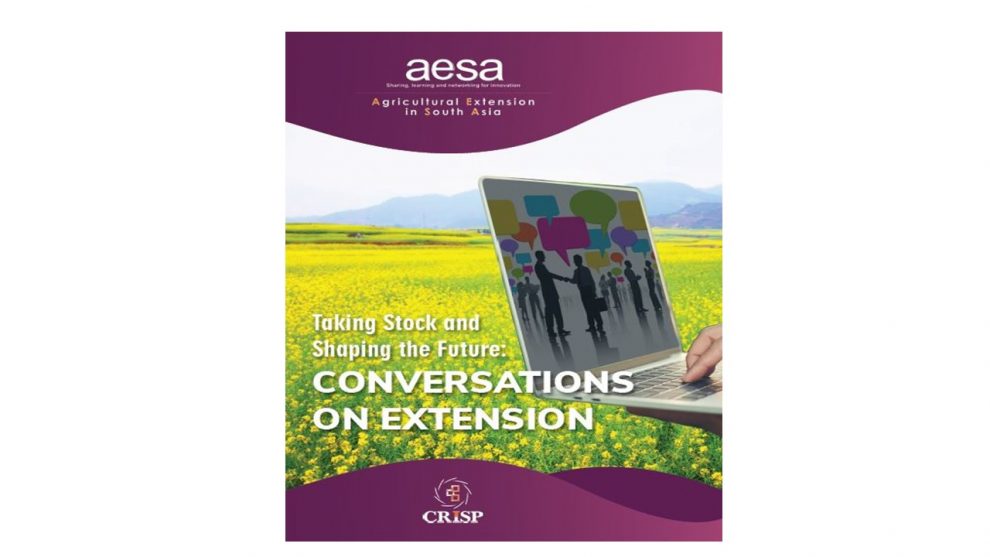
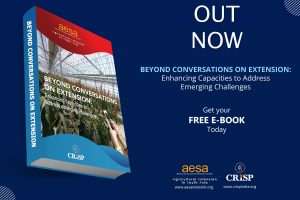
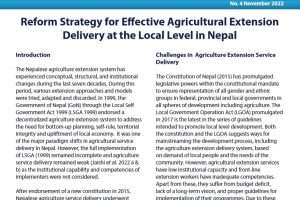
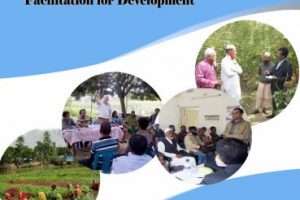
Nice to see the new publication from AESA by synthesizing the AESA blogs. The publication can be seen as an Extensiopedia on contemporary topics, as suggested by Sri. Suresh Kumar Sir, former Additional Chief Secretary & Principal Secretary (Agriculture), in one of his previous blogs. This collection will be really useful to all extension professionals, researchers and scholars in understanding various issues and topics of extension.
Very nice document.. CONGRATULATIONS to AESA and CRISP team and all the contributors for the great efforts.
This is an invaluable document resulted from the dedicated efforts of the several extensionists working with different institutions at various levels. I do not see any single book which has so much to offer in the field of extension on variety of topics of contemporary interests. On personal level, I am happy to see out of 100, 11 blogs were contributed by me, right from the very first blog when AESA started published blogs at this platform. This is going to be a very important resource material for all those preparing for various competitive exams including ARS. Congratulations to all the authors, the editors & AESA for bringing out such a useful publication for the good of the Extension & Advisory Services.
Great work and nicely organised theme wise. Every extension professional should keep this book handy for reference. Thank you AESA team
Congratulations to AESA team
Great effort and very useful publication! Kudos to CRISP/AESA Team!
Congratulation the AESA team and the editors !
Great work to prove How perfect extension make changes in grass root development…congrats to the authors for their committed work to bring such an interesting story of the prospects of sustainable development .
Great work from AESA and CRISP..
Congrats
“I congratulate Dr.Rasheed and his team for coming out with a wonderful compilation of 100 blogs contributed by 89 authors covering all important aspects of EAS and making it easy for the readers to get all the important publications in one place. No wonder, AESA emerged as a credible platform for extension professionals in south Asia
This compilation as hoped by the authors will lead to experimentation and reflection among extension professionals. I also wish that many of our colleagues will be initiating discussion on AESA publications which will encourage and motivate the youngsters to come forward to participate in discussion”.
Excellent work. This is become a platform for sharing of Eminent extensionists ideas and experience . I got valuable opportunity of publication of 100 block on public private partnership approach for tea smallholding sector
Congratulations team AESA
Very nice document.. CONGRATULATIONS to AESA and CRISP team and all the contributors for the great efforts.
Great effort. Keep contributing.
Congratulations to aesa group..
Very useful publication! Congratulations to CRISP and AESA team ??
Excellent contributions to the discipline … Kudos to the team
Thanks for putting this together I will certainly download and read.
You and your Editorial team deserves compliments for this great effort at compiling contributions of diverse professionals on EAS during the last 6 years. I particularly liked the way contributions are grouped in the publication making it easier to choose/select articles of interest. I hope extension professionals will take full benefit of this publication; I also hope you and your colleagues in CRISP will continue to encourage contributions from extension professionals as well as interaction between those involved in research and teaching with those involved in field application and develop innovative ways to make extension advisory services more effective – for the benefit of small holder producers.
Great work..CRISP team…hats off.
Great effort and appreciate the entire AESA team. Its a true Encyclopedia on Extension. Glad to see so many downloads within 3-4 days.
A wonderful publication which shares the lifetime experiences of Extension practitioners ,which is a readymade handbook of knowledge on Extension.This book should be introduced as a compulsory assignment for Agriculture students in RAWE programme
Great effort.. keep going… AESA
Hearty congratulations CRISP/AESA Team
The book is really interesting. Points of current importance have been intricately weaved into the chapters in a narrative manner. Truly inspiring. Feeling happy to read a wonderful compilation after a long time.
Congratulations….
Congrats from CAC-FRAS
Have kept it as a reference book in our department library.
Synthesis of Theme 1: Capacity Development for Extension Professionals from the publication “Conversations on Extension”
A. Key Learning Points (KLPs)
• Values drive our professional behavior, which are vital for all extension personnel.
• Extension workers need abilities to perform a task, referred to as competencies, which differentiate an effective extension worker from an ineffective one.
• Competence development of extension personnel is needed to operationalize innovation systems thinking.
• Competence, capacity and capability are inter-related and have to be properly understood. Competence is the ability to do a task efficiently, while capacity refers to the output that can be produced in a given period with the available resources. Capability is the ability to do things and to choose for an action according to one’s personal values.
• The justification of the status of extension as a profession in the present context is a big challenge that needs to be addressed.
• Extension and advisory services need to play a brokering role, promoting interactions and knowledge flows among the wide range of actors in the AIS.
• There are several challenges in teaching of extension in India in terms of quantity (shortage of faculty) and quality (outdated courses, pedagogical methods, tools and techniques).
• There is need to reinvent agricultural extension as a professional discipline, if it has to remain valid in the changing scenario such as dealing with collective issues, catering for diversified farming and livelihood strategy, changing professional identities, etc.
• The product life cycle is tied to the phenomenon of diffusion of innovations, which needs to be properly understood by the extension system.
• Three levels of deliberation, viz., a) deliberation on development problems, b) deliberation on the contexts that created the problems and c) deliberations on the philosophical and theoretical underpinnings are important in developing learning and innovation competence of extension personnel, which are more important than mere technological competence.
• Massive Open Online Courses (MOOCs) are a form of creative disruption in the field of education. To be effective, MOOC requires its own pedagogy and offer huge potential for enhancing the capacities of extension and advisory service providers.
• The underlying philosophy guiding current forestry research and education is based on bionomics of forests, which remains skewed towards conservation, ecosystem management and resource use optimization.
• The curriculum and syllabus of the B.V.Sc & AH course must match the job requirements of field veterinarians and must be assigned to a professional group well versed with such tasks.
B. Missing Gaps
• Oakley and Garforth (1985) have highlighted features of effective vs ineffective extension workers (Box 2, P2), which needs to be further improved based on the present day challenges.
• The core values in public sector extension are not made explicit to be honoured by extension personnel, whereas NGOs are better placed in this regard.
• Lack of adequate field orientation in teaching and poor professional standards in research have eroded the credibility of extension research and practice.
• Extension research is often criticized as a ‘non performing’ one, which needs to be properly addressed.
• As extension graduates are not properly equipped to perform the roles the market demands, they have difficulties to find appropriate jobs.
• Globally, there is an increasing interest in developing new capacities among extension and advisory services, which is yet to be fully tapped in the Indian context.
• The new and relevant competencies to become effective development practitioners and extension professionals are to be attained by the EAS in India.
• The lag in terms of new insights from both theory as well as the application of diffusion and innovation studies is a serious handicap.
• The potential of MOOCs is still not been realized by the extension system. The present curriculum has not accorded due emphasis to MOOC based learning or utilizing them as supplementary learning materials.
• The development of human capital in farming sector requires knowledge and skill sets sustainable to translate new concepts and practices into mainstream extension management strategy, which does not happen due to faulty curriculum.
• There are two regulatory bodies for Veterinary education in India, which needs to be addressed.
C. Suggested future activities
• The core values which contributes to professionalism in extension service may be identified and should form part of the curriculum and capacity building programmes.
• Transformative extension is to be adopted to enhance human capabilities which focus on transformation at the systems level.
• Extension research has to be strengthened for developing extension as a ‘performing discipline’.
• Some Universities in India such as PAU exhibit the exemplary way of improving the student research by inducting foreign experts in the student advisory committees, for providing an international exposure.
• While restructuring courses and content, the global experiences in field extension like the initiatives of GFRAS and MEAS should be considered towards modernizing EAS.
• Capacity building of teachers has to be strengthened for which induction trainings, refresher courses including overseas training have to be facilitated.
• To become effective extension professionals, competencies such as communication skills, group behavior and dynamics, facilitation of social capital, development programme planning and management, livelihood management and documentation and data analytics skills.
• There is a need to promote action research, which is a blend of theory and practice, which focuses on co-creation of knowledge of practice in the collaborative process of solving field problems for the purpose of bringing change.
• The definition of innovation needs to be oriented towards firm, product, market and consumer.
• There is need to promote sustainability oriented innovation models.
• Upscaling of local level innovations of farmers has to be done and is possible through strategically designed interventions.
• There is radical space for indigenous farm innovations which should be tapped by the extension system for successfully developing resilient, sovereign and productive local food and system.
• The topics of MOOCs for capacity building of extension professionals have to be identified and made use for strengthening agricultural AES.
• MOOCs can be effectively employed in addressing the knowledge divide and can supplement classroom teaching.
• MOOC platforms launched by MANAGE and NAARM can help acquire new skills by the extension personnel.
• The forestry education has to be strengthened to develop forestry as a multi-disciplinary domain where co-ordination and collaborative skills have unprecedented importance.
Synthesis of Theme 2: The Governance of Extension and Advisory Services
from the publication “Conversations on Extension”
A. Key Learning Points
– Organising public service provision is deemed to be a core function of governance, and since extension services are perceived to be a failure, reforms in extension service delivery is warranted.
– KVKs should focus on technology assessment and supporting agricultural planning in the district.
– The gap between generation of technological innovations and their utilization is constantly widening, which has to be addressed. Access to extension is an issue because of the low level of outreach by public extension service.
– Successful promotion and application of new knowledge requires collaboration of several actors, complimentary policies and progrmmes and a favourable policy environment.
– The changing roles and expectations from KVKs necessitate regular capacity building of its professionals.
– Skill development training for rural youth has to be given more emphasis by KVKs by establishing linkages of KVKs with National Skill Development Council.
– KVKs have to devise mechanisms to overcome the challenge of low investments and inadequate manpower, including tapping into CSR funds.
– Public organisations are strong in backward linkages, while private organisations are strong in forward linkage. NGOs are strong in social engineering and mobilization. Convergence can tap the comparative advantage of different organisations.
– Extension personnel need to internalize the concept of ‘noblesse oblige’, which requires the persons holding power and status in society to fulfill social responsibilities.
– Extensionpedia is a mechanism for capturing and collecting the discourse on extension happening among wide range of stakeholders in different locations for consideration in policy, implementation and review.
– A strong sense of empowerment engendered by vigilant public action is required to make rural democratization functional and vibrant.
– Enactment of legislations and prescribing service standards need to be carried forward, enlarged, enriched and supplemented, and recognized as Farmers’ Charter to ensure accessibility of services to farmers.
B. Missing gaps
– Farmers in different contexts require different set of support and services for the extension system, which is not forthcoming.
– Though NARS has put forth the concept of Good governance in Agriculture, governance of KVKs has not received enough attention, which it deserves.
– Capacity building of farmers has largely remained inadequate due to absence of effective institutional mechanisms and inadequate human resources.
– There are poor functional linkages among farm institutions at different levels of government.
– Lack of clarity on governance is a big issue affecting the functioning of KVKs.
– Partnerships under KVKs will continue only as along as mutual benefits exist, and withdrawal is a common when goals diverge.
– Faculty excellence is a critical factor in determining the level of competence. Faculty who have done rigorous research for their theses will also go on to ensure and enforce rigour in the working of the organization.
– Very low outcome of the informal discourse in extension is the biggest waste of natural resources, which is still not being recognized with priority and focus.
– The decentralization of extension has been affected by various factors such as weakening of linkages in research, lack of funds for technical training, local political priorities not in tune with the interests of small farmers.
Suggested Future Activities
– To ensure good governance, reforms in Extension should focus on administrative, structural and legal aspects of extension provision.
– Extension should broaden the services from mere technology dissemination and capacities at the organizational level to deal with emerging issues and concerns, which have to be enhanced for improving governance.
– A suitable strategy and model have to be developed to promote sustainable and mutually rewarding partnerships at KVK level.
– There is need for reorienting the present supply-oriented system to demand-driven rural advisory service.
– Harnessing the potential of various actors, programmes and policies should be an important strategy for extension and advisory services.
– KVKs must develop farmer entrepreneurs, who can further help in technology transfer through mechanism of farm to farm extension.
– In the increasing pluralistic extension landscape, partnerships are emerging to be the key to design and delivery of effective and efficient extension services, which has to be addressed.
– Planning scientific capacity building requires quantification of capacity across the line- from the lowest to the highest. The capacity of each extension functionary needs to be assessed annually with respect to the requirement of the job, quantitatively.
– The concept of ‘Extensionpedia’ may be operationalized by a national agency like MANAGE or any other anchor organization. Communities of Practice (CoPs) may be constituted for various thematic and sub thematic areas.
– Extension scientists as development interventionists and social researchers should explore the dynamics of rural democratization. Evolving a robust system of rural democratization warrants critical social action and a departure from the conventional norms of participation.
– An All India Co-ordinated Project on Study of farm distress and suggesting remedial measures may be instituted by ICAR.